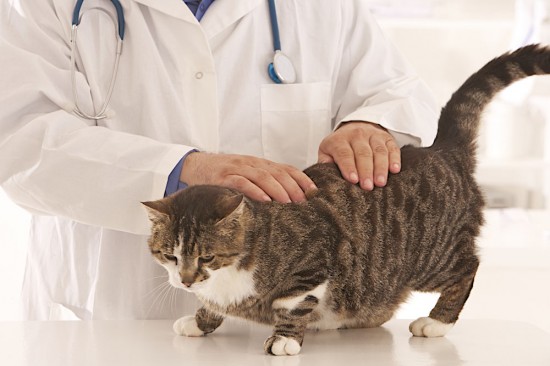
If you have never owned a cat before and are thinking of getting one, you may find yourself with many questions. Hopefully, this article will answer most, if not all of them.
First there is the question of food. Please ignore all those cutsie cat food commercials, and don't bother with the cat food aisle in the grocery store. Instead, go to a natural food store, or a pet supply store that specializes in natural products.
A premium quality food will have no by-products, no artificial colors, flavors or preservatives. It will list a meat-based protein source first, such as chicken or lamb. The better ones will have more than one protein ingredient.
Grains should be kept to a minimum, and should be whole grains, not fractions such as corn gluten meal or rice bran. There are many grain-free varieties on the market now, as grains are often the source of food allergies in cats.
Cats and kittens require a high protein, high fat diet.
Feed kittens two to four times a day, less often as they get older. Pick up any leftover food after thirty minutes.
Don't worry if it doesn't look like the kitten is eating much. Even adult cats usually eat a small amount at a time, and kittens are very small animals. Cats also won't eat if upset or nervous, as your new kitten will probably be.
Be sure to have water available at all times, though most cats do not drink much water, especially if they are eating canned food.
For food dishes, any small, shallow container will work. They seem to have the easiest time getting every last bit out of dishes with rounded bottoms. You can offer treats if you like, but don't overdo it,or the cat will wait for them and not eat it's regular diet. You also run the risk of overfeeding. Be sure to use a premium brand of treat as well, and never feed the soft ones - they contain harmful chemicals.
Many cats like certain fruits and vegetables. Experiment to see what your kitten likes and use tiny bits of these for treats. Some foods they often like include cantaloupe, broccoli, green beans, asparagus and squash.
Treats can be used to train a cat, and can be useful in getting them used to brushing and nail trimming.
The next item you will need for a cat is a litter box or two. The type of litter you choose depends more on your preference than the cat's, although as a rule I would avoid any scented litters.
Keep the boxes clean by removing solid waste several times a day. Clumping litters allow you to remove the urine as well, but these types may not be good for your cat's health. The properties that allow the litter to clump together also cause it to clump in the cats intestine if they ingest too much of it. (They will often have a grain or two stuck to a paw, which they will swallow during grooming).
For non-clumping litters, stir the litter to disperse the urine, this allows it to dry quickly and lessens odor. Change the litter entirely once a week or as needed.
The mother cat usually trains her offspring to use the litter box. Unless you have adopted a feral kitten that has never seen one, the most you may need to do is to put the kitten in the box and scratch the litter a little bit. Let him get out by himself, so he can orient himself to its location. A scratching post for your kitten will save your drapes and furniture. Sisal posts are best, but many cats enjoy the cardboard ones,sprinkled with a little catnip.
Get your kitten used to having his paws handled early on, in preparation for your trimming his claws. Buy a special scissors for the purpose, and make it a pleasant occasion for the kitten. Do this by giving extra yummy treats or by giving him lots of love and affection in between each snip of the scissors.
You will want to have your new kitten examined by a veterinarian as soon as possible. If you are looking for a vet for the first time, start by asking trusted friends and coworkers. Choose a vet as you would any doctor. You want someone you can be comfortable with, someone who will answer your questions and take time to talk about your concerns.
Kittens love to play - especially late at night. They don't really need any special toys, but you may enjoy shopping for them. When giving them something to play with, give it the same thought you would in giving a toy to a baby or small child - as in can they swallow this?
While string and yarn are thought of as cat toys, they are actually dangerous. Many cats will swallow strings, and they can severely tie up the intestines. I have made simple catnip toys by stuffing infant socks with dried catnip and sewing them closed. Paper bags also make great toys.
Cat beds are nice, but few cats restrict themselves to one sleeping place. They like to follow the sun, and couch backs and your bed are favorite places. Cats like small spaces, so the kitten will probably be most comfortable in a kitten-sized bed, which means you will have to replace it as she grows. A basket lined with a soft towel works fine, too.
The world is a scary place for young kitten, especially if it has just left its mother. To minimize stress, put your kitty in a quiet room by himself when you first bring him home. Put his food, water and other supplies in there with him and leave him alone for a while. Allow him time to get used to a new environment before adjusting to people. In no time he will discover that your lap is a very comfortable place to be and your touch is a source of pleasure.
Cats are amazingly self-reliant animals. They will learn the ropes just fine. In a day or two, open the door to the cat's room and let him begin to explore.
Kittens should come in pairs. One is fun, but two is better. The two will play together, sleep together and provide endless hours of entertainment and photo opportunities. They will also chase each other across your bed at 2:00 am.
Elyse Grau is an herbalist and a long-time pet owner, well-versed in pet nutrition and feeding. She is the author of Pet Health Resource, your web guide to a healthy, happy dog or cat. The website strives to answer your holistic pet health questions through a large collection of articles.
http://www.pethealthresource.com
 Outdoor Hazards That Can Be A Threat To Your Puppy
Outdoor Hazards T
Outdoor Hazards That Can Be A Threat To Your Puppy
Outdoor Hazards T
 All About Cat Only Veterinary Practices
All About Cat Onl
All About Cat Only Veterinary Practices
All About Cat Onl
 Grooming A Heavy-shedding Dog And Dealing With A Blown Coat
Grooming A Heavy-
Grooming A Heavy-shedding Dog And Dealing With A Blown Coat
Grooming A Heavy-
 Some Of The Stranger Forms Of Canine Behaviour Decoded
Some Of The Stran
Some Of The Stranger Forms Of Canine Behaviour Decoded
Some Of The Stran
 The process of moving to Singapore with dogs- what you need to know
The process of moving to Singapore with dogs- what you nee
The process of moving to Singapore with dogs- what you need to know
The process of moving to Singapore with dogs- what you nee
Copyright © 2005-2016 Pet Information All Rights Reserved
Contact us: www162date@outlook.com